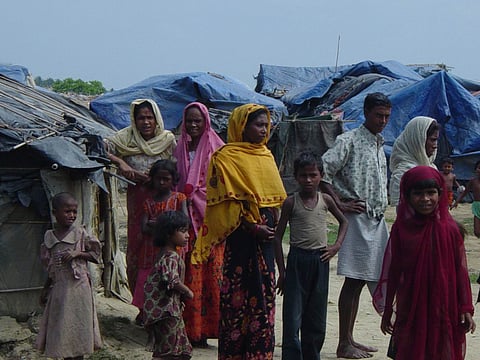The dispossessed ghetto dwellers
Pakistan must bring back its own people from the wilderness

While the United Nations Universal Declaration of Human Rights states every person has a right to a nationality, there are more than a quarter million ghetto dwellers in squalid camps in Bangladesh that enjoy no such luxury. For the past 37 years, they have been dispersed across Bangladesh in 70 camps, each not bigger than a football field. Their woes have been magnified due to poor sanitation and continued lack of services such as electricity and running water. They have also been denied any nationality.
These are the Biharis, forgotten remnants of the India-Pakistan partition that took place more than 67 years ago. In pre-independence India, they were a Muslim minority in the region of Bihar. At the time of the partition in 1947, many moved to what was then East Pakistan. When civil war broke out between East and West Pakistan, the Biharis sided with the West. Subsequently, in 1971, East Pakistan became the independent state of Bangladesh and these Biharis who had been loyal to Pakistan were denied citizenship because they were deemed as collaborators and had “supported the enemy”.
Their first choice was to leave the new nation and go to the west —Pakistan. They expected to be welcomed and they waited. Four decades later, they continue to wait in silence and despair. Pakistan initially denied them permission to immigrate to Pakistan, fearing a massive influx of ill-equipped refugees that could destabilise the country. The legal limbo they find themselves in predicts an even more despondent future.
For 41 years, two or three generations of these unfortunate individuals have been living a life of misery, malnutrition in appalling, unhygienic conditions in a number of refugee shelters, where the conditions, as reported by NGO workers, are deplorable and large groups of families are often forced to share their living areas with animals. They have no tenable rights, limited job options and few economic prospects. They are refugees. Although they did not desert their country, their country appears to have forgotten them.
They remain stateless and non-citizens of Bangladesh or Pakistan. They had been denied access to government services, including education, formal employment, property ownership and driving licences. In the past, many Pakistani government heads promised to bring them to Pakistan, but never made good on their promises.
There have been some notable NGOs working towards their repatriation and welfare. On of them was the Rabita Trust established in 1988 under the auspices of the then Pakistani President, the late General Zia-ul-Haq, and Dr Abdullah Naseef, the former secretary-general of the Saudi Arabia-based Muslim World League. Their mission was to expedite the re-integration of these displaced refugees back into Pakistan with support from national and international relief agencies.
One of their first plans was to organise the repatriation of the stranded Pakistanis and domicile them in the Punjab province of Pakistan. Plans were also drawn for an estimated 40,000 homes that would be built to serve their reintegration.
Suffering in silence
Three thousand fortunate families were issued Pakistani ID cards back in 1992 and were housed in some 1,000 residential units that were built in the Punjab province to accommodate them. Unfortunately, funds began drying up thereafter and the political climate in Pakistan in recent years has slowly pushed this issue on the back-burner. As a result, those left behind continue to suffer in silence.
Another group, the Pakistan Repatriation Council, operating out of Jeddah in Saudi Arabia, was not content to let the plight of these people go unnoticed. It has been fervently working towards realising its goal of ensuring a dignified return of these hapless people. Through a series of meetings and symposiums this group has managed to highlight the plight of these forgotten Pakistanis in the media.
So much so that the Supreme Court of Pakistan finally sat up and took notice. In January this year, the court, frustrated with the government’s delays in responding to a petition filed back in 2009, ordered the ministry concerned to submit its answers on the petition within a given time-frame, warning that non-compliance would not be palatable to the three-judge bench. The bench publicly expressed its annoyance over non-compliance of the court order and warned that the ministry heads would be dragged to court for repeated failures. This petition has also urged the Government of Pakistan to resolve the issue of all stateless persons and their families in the internment camps who want to become citizens of Pakistan in accordance with national laws and international conventions. “Pakistan must permit return of all stateless people (stranded Pakistanis) and their families from the internment camps in Bangladesh,” the bench said. The ball is now in the Pakistan government’s court. Pakistan faces many challenges today, but bringing back its own people from the wilderness should rank high on its list of priorities. It is a humane thing to do.
Tariq A. Al Maeena is a Saudi socio-political commentator. He lives in Jeddah, Saudi Arabia.



